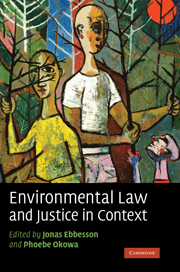Book contents
- Frontmatter
- Contents
- List of contributors
- Preface and acknowledgments
- 1 Introduction: dimensions of justice in environmental law
- Part I The notion of justice in environmental law
- 2 The second cycle of ecological urgency: an environmental justice perspective
- 3 Describing the elephant: international justice and environmental law
- 4 Law, justice and rights: some implications of a global perspective
- 5 Gender and environmental law and justice: thoughts on sustainable masculinities
- Part II Public participation and access to the judiciary
- Part III State sovereignty and state borders
- Part IV North–South concerns in global contexts
- Part V Access to natural resources
- Part VI Corporate activities and trade
- Index
- References
4 - Law, justice and rights: some implications of a global perspective
from Part I - The notion of justice in environmental law
Published online by Cambridge University Press: 28 June 2009
- Frontmatter
- Contents
- List of contributors
- Preface and acknowledgments
- 1 Introduction: dimensions of justice in environmental law
- Part I The notion of justice in environmental law
- 2 The second cycle of ecological urgency: an environmental justice perspective
- 3 Describing the elephant: international justice and environmental law
- 4 Law, justice and rights: some implications of a global perspective
- 5 Gender and environmental law and justice: thoughts on sustainable masculinities
- Part II Public participation and access to the judiciary
- Part III State sovereignty and state borders
- Part IV North–South concerns in global contexts
- Part V Access to natural resources
- Part VI Corporate activities and trade
- Index
- References
Summary
Jurisprudence
In academic life there is a widespread tendency for bodies of literature to talk past each other. This seems to be the case with much of the literature on environmental law, environmental justice, mainstream jurisprudence, and globalisation. This chapter suggests some chasms and some connections between them, and relates to the question: ‘What are the implications of so-called “globalisation” for the institutionalised discipline of law and especially for jurisprudence, conceived as the theoretical or more general part of that discipline?’ I shall reflect on a number of themes, concepts, and distinctions that are broadly relevant to debating issues about environmental justice in today's world: including the nature of theorising about law; the discourses of globalisation; picturing law from a global perspective; normative jurisprudence, especially theories and discourses of justice and human rights.
I treat jurisprudence as the theoretical or more abstract part of law as a discipline. Philosophy of law is the most abstract part of jurisprudence, which is also concerned with a wide range of theoretical issues that are not primarily philosophical. Jurisprudence can be conceived of as both a heritage and an activity. Western jurisprudence has a vast heritage of texts, questions, answers, and arguments. It can also be conceived of as an activity directed to posing, reposing, reflecting on, hypothesising answers to, and arguing about these questions.
- Type
- Chapter
- Information
- Environmental Law and Justice in Context , pp. 76 - 97Publisher: Cambridge University PressPrint publication year: 2009
References
- 3
- Cited by



